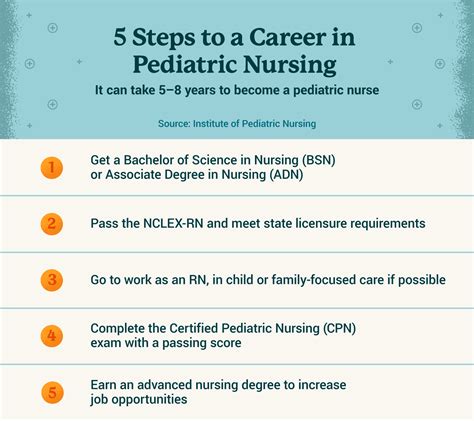Are you a compassionate and dedicated pediatrician with a passion for making a difference in the lives of children? If so, you’re in luck because the field offers a wide array of employment opportunities.

Employment Outlook for Pediatricians
The job outlook for pediatricians is expected to remain strong in the coming years, with the Bureau of Labor Statistics (BLS) projecting 12% growth between 2020 and 2030. This projected growth stems from several factors, including:
- Increasing demand for pediatric services due to the growing number of children in the United States
- A large number of pediatricians nearing retirement age
- Increased focus on preventive care and early intervention
Career Paths for Pediatricians
Pediatricians can pursue a variety of career paths, depending on their interests and skills. Some common options include:
- General Pediatrics: Providing comprehensive care to children from birth through adolescence
- Pediatric Subspecialties: Specializing in specific areas of pediatrics, such as cardiology, pulmonology, or neonatology
- Research: Conducting research to improve the health and well-being of children
- Advocacy: Working with organizations to improve policies and programs that impact children
- Education: Teaching medical students and residents about pediatrics
- Administration: Managing and overseeing pediatric departments or organizations
How to Enhance Your Pediatrician Employment Opportunities
To enhance your pediatrician employment opportunities, you can:
- Earn a Bachelor’s Degree: The first step to becoming a pediatrician is to earn a bachelor’s degree, typically in a science-related field such as biology or chemistry.
- Attend Medical School: After completing your bachelor’s degree, you’ll need to attend medical school and obtain a Doctor of Medicine (MD) or Doctor of Osteopathic Medicine (DO) degree.
- Complete a Residency in Pediatrics: After earning your medical degree, you’ll need to complete a 3-year residency in pediatrics, focused on providing comprehensive care to children.
- Obtain Board Certification: Once you’ve completed your residency, you can obtain board certification from the American Board of Pediatrics (ABP). Board certification demonstrates your knowledge and skills in pediatrics.
- Gain Experience: Gain experience in different areas of pediatrics to enhance your career prospects.
Benefits of Working as a Pediatrician
Working as a pediatrician offers several benefits, including:
- Making a Difference: Pediatricians have the opportunity to make a significant impact on the lives of children and their families.
- Job Stability: Pediatricians are in high demand, leading to job stability and ample employment opportunities.
- Financial Rewards: Pediatricians earn competitive salaries, with the BLS reporting a median annual salary of $189,730 in May 2021.
- Flexible Work Options: Some pediatric positions offer flexible work arrangements, such as part-time work or telecommuting.
- Intellectual Stimulation: Pediatrics is a rapidly evolving field, ensuring ongoing intellectual stimulation and opportunities for continuing education.
Common Mistakes to Avoid When Applying for Pediatrician Positions
When applying for pediatrician positions, avoid making these common mistakes:
- Not Tailoring Your Resume and Cover Letter: Customize your resume and cover letter to highlight your experience and qualifications that are relevant to the specific position you’re applying for.
- Neglecting to Network: Network with other pediatricians, attend industry events, and reach out to recruiters to increase your visibility and make valuable connections.
- Overlooking Professional Development: Stay up-to-date on the latest developments in pediatrics by attending conferences, reading journals, and participating in continuing education programs.
- Failing to Emphasize Your Advocacy and Leadership Skills: Highlight your advocacy and leadership skills, such as working with organizations to improve child health policies or serving as a mentor to other healthcare professionals.
- Neglecting to Research the Organization: Before applying for a position, thoroughly research the organization to understand its mission, values, and culture to ensure it aligns with your own.
Frequently Asked Questions (FAQs)
Here are some frequently asked questions about pediatrician employment opportunities:
- What is the starting salary for a pediatrician?
According to the BLS, the median annual salary for pediatricians was $189,730 in May 2021. However, salaries can vary depending on factors such as experience, location, and subspecialty.
- Is the job market for pediatricians competitive?
The job market for pediatricians is generally competitive, but the demand for qualified professionals remains high. Pediatricians with specialized skills or training may have an advantage in securing competitive positions.
- What is the best way to find pediatrician job openings?
You can find pediatrician job openings through various channels, including:
- Healthcare job boards (e.g., LinkedIn, Indeed, Glassdoor)
- Hospital and clinic websites
- Healthcare staffing agencies
- Professional organizations (e.g., American Academy of Pediatrics)
- What are the most sought-after skills for pediatricians?
In addition to clinical skills, employers are increasingly looking for pediatricians with:
- Communication and interpersonal skills
- Leadership and management abilities
- Interest in population health and community outreach
- Technological proficiency
- Cultural competency
- How can I stand out in the pediatrician job market?
To stand out in the pediatrician job market, consider:
- Joining professional organizations and contributing to their activities
- Volunteering or participating in community health programs
- Pursuing additional training or certifications
- Developing your research and academic portfolio
- Building a strong online presence
- What is the career advancement potential for pediatricians?
Pediatricians have various opportunities for career advancement, including:
- Leadership positions: Clinical directors, department heads, chief medical officers
- Research: Principal investigators, clinical research coordinators
- Academia: Teaching faculty, medical school administrators
- Policy and advocacy: Public health officials, healthcare consultants
- Are there any alternative career paths for pediatricians?
Yes, pediatricians can explore alternative career paths, such as:
- Medical writing and editing
- Healthcare administration
- Health policy and advocacy
- Child development and education
- Global health
- What is the future of pediatrics?
The future of pediatrics is promising, with a growing focus on preventive care, population health, and personalized medicine. Advancements in technology and genomics are also expected to shape the field, leading to new diagnostic and treatment options for pediatric patients.
